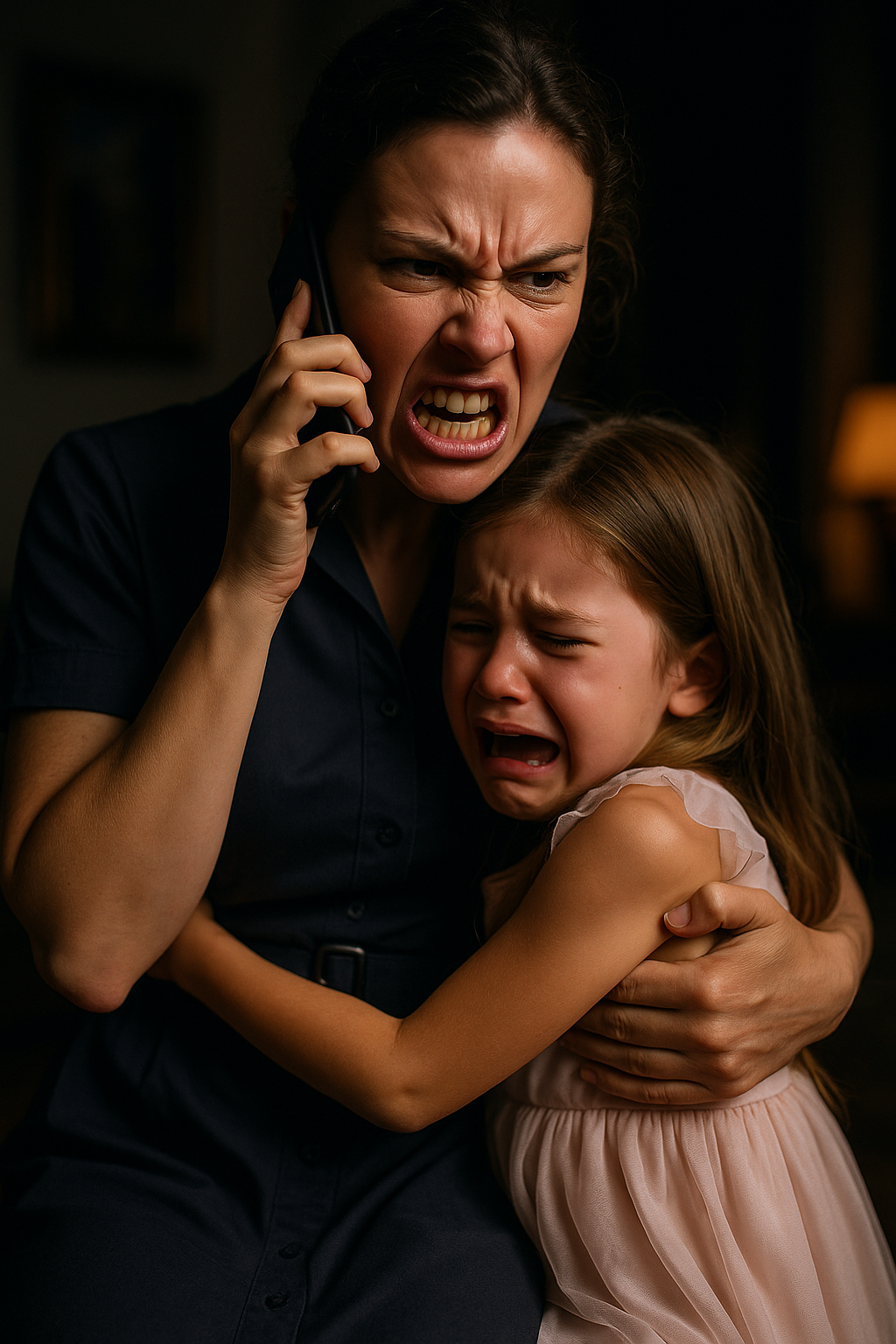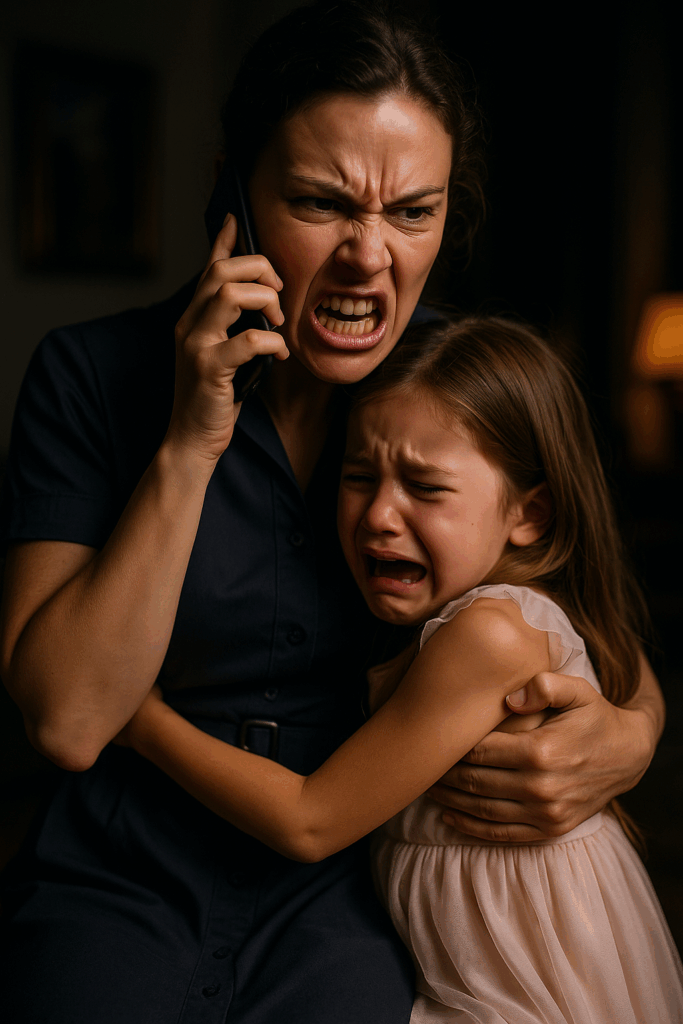My daughter, Lily, at ten years old, was a whirlwind of glitter, imagination, and a fierce, unshakeable belief in the magic of promises. Our life, after my divorce from Robert, had been challenging, a constant balancing act of single motherhood and a demanding career. But Lily was my anchor, my joy, and her unwavering hope in her father, despite his frequent disappointments, often broke my heart.
The Father-Daughter Dance was an annual event at her school, a beacon in the dreary February calendar. For weeks, Lily had been buzzing with anticipation. Robert, in a rare moment of genuine enthusiasm, had promised to take her. He’d even helped her pick out a dress. “This is the one Daddy will love,” she’d whispered, twirling in front of the mirror, her eyes shining. It was a vision in lilac tulle, layers upon layers of soft fabric that puffed out around her like a fairy’s cloud.
That evening, the cold February night began to settle in, painting our front window with hues of deep violet and fading gray. Lily, a small, vibrant silhouette, stood glued to the glass, her nose pressed against the cold pane. Her lilac dress, chosen with such care, seemed to glow in the dimming light. She was watching for headlights that never came.
“Mommy, do you think he got lost?” she asked, her breath fogging a perfect circle on the glass, her voice tiny and hopeful.
“He knows the way, sweetie,” I said, my voice artificially bright, a performance I was becoming too adept at.
My stomach churned with a familiar dread.
The dance started at seven. It was already 7:15. I had texted Robert an hour ago, a simple reminder, a gentle prod. My phone showed the message had been read. No reply. The silence stretched, each ticking second a lead weight in my chest.
Finally, at 7:47 p.m., my phone buzzed with an incoming text from Robert. My hands shook as I reached for it, a desperate sliver of hope flickering within me. Maybe a last-minute emergency, an apology I could spin into something palatable for Lily, a reason for her to still believe.
The message was not an apology. It was a stark, brutal statement of fact, devoid of warmth or regret, cold in its simplicity.
“Taking Jessica’s daughter instead. 7-year-olds are more fun at these things. Lily will understand. Buy her ice cream or something.”
I read it once, twice, three times. Each time, the words twisted a fresh knife in my gut. Jessica. His new wife.
He chose her child. Over his own. Because she was “more fun.” The callousness of it was a physical blow.
“Is that Daddy?” Lily’s voice, fragile with a hope that refused to die, pricked my ears. One last, heartbreaking time.
I sank to the floor beside her, pulling her close, burying my face in her soft hair, inhaling the faint scent of her shampoo, trying to find words that wouldn’t shatter her completely. “Baby, Daddy’s not coming tonight.”
Her face, usually so animated, crumpled. It wasn’t a sudden explosion of tears, not a scream of frustration. It was worse. She didn’t wait for an explanation, didn’t ask why. She stood up, her beautiful lilac dress rustling softly around her, a cruel mockery of the joy she’d anticipated. She walked to her room, her small shoulders slumped, the very air around her thick with profound disappointment. No running, no door slamming, just the quiet, devastating dignity of a little girl who’d aged years in a matter of seconds. I heard her door close softly, and then came the sound that will haunt me forever: my baby girl, sobbing into her pillow, her small heart breaking, still wearing the dress she’d believed would make her daddy proud.

In that moment, something inside me irrevocably shifted. The familiar ache of disappointment, the worn-out tapestry of forgiveness, all vanished. I didn’t cry. I didn’t scream. A cold, crystalline calm settled over me, sharp and unwavering. I walked into the hallway, my steps deliberate, and made one phone call.
“Marcus,” I said, my voice eerily even, utterly devoid of emotion, yet humming with a suppressed fury. “It’s me. Robert did it again. But this time… this time is different. This time, he put it in writing. I have the proof you need.”
Five days later, Robert’s lawyer called him. It happened during a high-stakes business meeting, one that would solidify his biggest deal of the year. According to his frantic secretary, he went so pale that she thought he was having a heart attack. The deal, I later learned, was put on ice. His world, so meticulously built on appearances, had finally begun to crack.
Marcus, my divorce attorney, was a bulldog. He had always warned me about Robert’s manipulative tactics and his tendency to push boundaries, but legal systems require evidence. Robert’s text, so carelessly sent, was the golden ticket. It was undeniable proof of his deliberate abandonment, his emotional cruelty, and a clear violation of the “best interests of the child” clause in our custody agreement.
Marcus immediately filed an emergency motion to review and amend the custody arrangements. Robert, initially dismissive, quickly realized the gravity of the situation. His reputation, carefully cultivated over years, was at stake. The news of the incident, once confined to our small circle, began to ripple outwards, whispered in school hallways and country club lunches. His law firm, sensitive to public image, put pressure on him.
The initial legal proceedings were intense. Robert, enraged, fought back with venom, painting me as an overprotective, unstable ex-wife. But the text message, magnified on a courtroom screen, spoke volumes. Lily’s therapist, whom I had taken her to immediately, provided a compelling report detailing the emotional distress and profound sense of rejection Lily experienced.
Then, a surprising ally emerged. Jessica, Robert’s new wife, contacted me. She had been mortified by Robert’s actions and the text message. She confessed that Robert had a pattern of impulsive, cruel behavior when under stress, and that he frequently disregarded Lily’s feelings, prioritizing his own comfort and image. She had tried to reason with him that night, but he had dismissed her, claiming Lily was “too sensitive” and “needed to learn resilience.” Jessica admitted she too was trapped in a gilded cage, fearful of Robert’s temper, but she could not stand by and let Lily continue to be hurt. She secretly began to provide Marcus with valuable information about Robert’s financial misdealings and undisclosed assets, information that would significantly impact his legal standing.
The court ruled decisively. Robert’s visitation rights were severely restricted, moving from a standard schedule to supervised visits, and his financial contributions were significantly increased. The custody agreement was rewritten, granting me full decision-making power for Lily’s upbringing. His public humiliation was complete, his carefully constructed career taking a massive hit. He became a pariah in his social circles, a cautionary tale whispered among parents.
Life with Lily slowly began to heal. She still carried the scar of that night, but with consistent therapy, my unwavering love, and the removal of Robert’s toxic influence, her light began to return. She found joy in new friendships, discovered a passion for painting, and eventually, hesitantly, allowed herself to hope again.
Years passed. Lily blossomed into a confident, compassionate young woman, forging her own path, far removed from the shadow of her father’s cruelty. Robert, stripped of his power and connections, had faded into obscurity, a bitter, lonely figure.
Then, an unexpected letter arrived. It was from a law firm, not Robert’s, but an old, prestigious firm. It was addressed to Lily. It was regarding the estate of her paternal grandfather, Robert’s father, Richard.
Richard, a formidable and often intimidating man, had passed away quietly. I had always assumed he had sided entirely with Robert, never acknowledging Lily after the divorce. But the letter revealed a stunning truth: Richard had, in secret, been observing Robert’s increasingly erratic and cruel behavior, not just towards Lily, but towards others. He had always been a man of strict principle, however harsh, and Robert’s public disgrace and continued emotional abuse of Lily had deeply offended his sense of justice.
In his will, Richard had disinherited Robert entirely. Instead, he had left the vast majority of his significant estate—including a substantial trust fund and his beloved ancestral home—to Lily. The will included a clause explicitly stating that the inheritance was “for Lily, who embodies the integrity and compassion her father regrettably lacks, and to ensure she is never again subjected to the whims of a capricious and undeserving parent.” He had secretly kept tabs on Lily, admired her resilience, and sought to correct the wrongs of his son, leaving Lily with a legacy far beyond money – a powerful testament to her worth, and a final, crushing blow to Robert’s pride and future.
I watched Lily, now a vibrant college student, walk through the halls of her inherited ancestral home, her face thoughtful as she looked at old family portraits—portraits that, for the first time, truly felt like her family. Robert, receiving the news of his disinheritance, had reportedly spiraled into a bitter despair, completely isolated.
The Father-Daughter Dance, once a symbol of profound betrayal, had become the unlikely catalyst for an unexpected inheritance, a powerful act of posthumous justice. Lily was now free, not just from her father’s cruelty, but empowered by a legacy meant to protect her. But the echoes of that painful night still lingered.
How would Lily reconcile the complicated legacy of a grandfather she barely knew, who chose her over his own son? How would she navigate the future, knowing the profound impact of a father’s abandonment and the unexpected redemption from another? And how would I, as her mother, help her understand that even from the deepest pain, an unforeseen strength and an incredible future can emerge, all because a mother refused to let a promise broken define her child?


